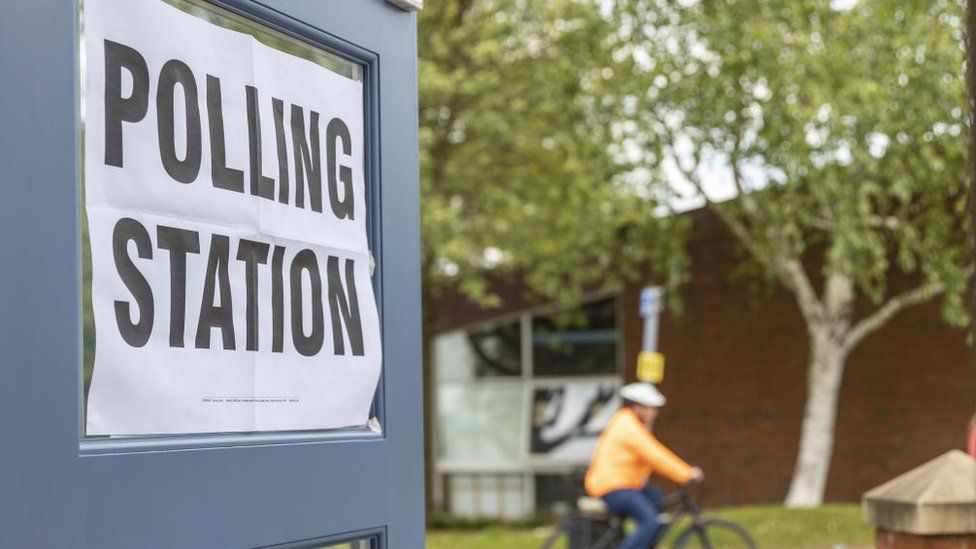
By Pete Saull, Charley Adams & Joshua Nevett
BBC News
Staff overseeing May’s local elections could be “overwhelmed” as they deal with the introduction of compulsory voter ID, councils have warned.
For the first time, everyone voting in person in English local elections on 4 May will need to show identification.
The Electoral Commission said there had been extensive planning to get councils ready for the challenge.
Critics say the changes are unnecessary and will damage democracy by making it harder for some to vote.
Prime Minister Rishi Sunak has said the ID checks will ensure elections are “high-integrity processes”, despite no evidence of large-scale electoral fraud in the UK.
Since 2018, there have been nine convictions and six police cautions issued in connection with cases of electoral fraud, according to the Electoral Commission.
The Local Government Association (LGA) – which represents local authorities – said the practical difficulties faced by councils enforcing ID checks “should not be underestimated”.
LGA spokesman Kevin Bentley said local authorities “remain concerned about the potential for electoral staff to be overwhelmed with enquiries and voter authority certificate applications, now polling cards have been issued”.
Mr Bentley, the Conservative leader of Essex County Council, also said polling station staff might have to deal with abuse from voters who did not bring ID, telling the BBC “that could possibly happen”.
He did not rule out calling on the UK government to scrap voter ID checks at the general election, due next year, if there are widespread problems on 4 May.
“If that were the case we would have that honest conversation”, he said.
With the local elections now less than three weeks away, new research from the Electoral Commission shows that almost a quarter of people it surveyed still did not know that photo ID was required to vote.
Craig Westwood, from the Electoral Commission, said that voters often “respond late” ahead of elections and “we always see a very significant spike in the days leading up to the deadline”.
The communications director said the Commission had been running a campaign since January to make sure people were aware of this change.
“The awareness in the public has gone up from 22% to 76% over that period and that’s still with a month to go,” he added.
Awareness drive
The new rules mean that voters need to take photo ID to get their ballot papers in local elections in England, police and crime commissioner elections in England and Wales, and UK parliamentary elections.
However, it is thought more than one million eligible voters do not currently have accepted forms of photo proof.
People who do not have the right photo ID can apply for a free voter ID document – a “voter authority certificate” – from their local council.
The deadline to register for one of these is 25 April – but government data shows just 60,368 people have applied since the scheme was launched.
Mr Westwood said “people understand” the new photo ID rules, adding that applications for the voter authority certificate were increasing “day by day”.
He also said there would be more staff at polling stations during the local elections in May.
Officials, who will be called “greeters”, will be positioned outside some polling stations to “make sure that people are definitely aware of the ID requirement”, he added.
Deputy Labour leader Angela Rayner said voter ID was “an expensive, unnecessary policy and the wrong priority at the height of a cost-of-living crisis”.
The Liberal Democrats have called on the government to “cancel the voter ID measures before too many people lose their voice in this year’s local elections”.
Green Party Co-leader Adrian Ramsay said young people and over-75s were most at risk of being disenfranchised and warned that denying their right to vote could “swing results”.
Watch: Ione Wells explains the new rules for voting in England, in a minute
South Norfolk Council is leaving nothing to chance, producing a rap video with the authority’s managing director “spitting bars” and urging people to “ID like a boss”.
There are 22 forms of accepted ID that can be used in polling stations including passports, driving licences and blue badges – as well as the free voter ID certificate.
From October the compulsory voter ID rules will also apply to any future general elections. Photo ID is not required for postal votes.
In Northern Ireland – where photo ID is already required – 11 council elections are being held on 18 May. There are no local elections in Wales and Scotland in May.
Voters in England, Scotland, Wales and Northern Ireland will be required to show ID at the next general election, widely expected in 2024.
Rishi Sunak said on Conservative Home on Thursday that about 98% of people already had acceptable forms of ID for voting.
The most commonly held form of ID was a passport, which 91% of people had.
But the Electoral Commission’s research found a higher number, with 3% of people not having any photo ID and another 1% not having any photo ID where they think they are recognisable.
ONS figures from 2021 show almost 50 million people were registered to vote in local elections across the UK. That means that if 4% of people do not have acceptable ID, almost two million people will need to get hold of some if they want to vote.
Although not all registered voters have elections in their areas this year, they will all need to get ID if they want to vote in the general election, which is expected to take place in 2024.

